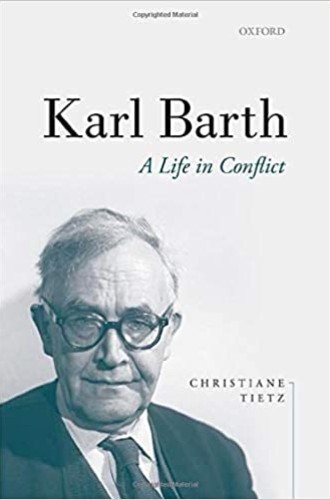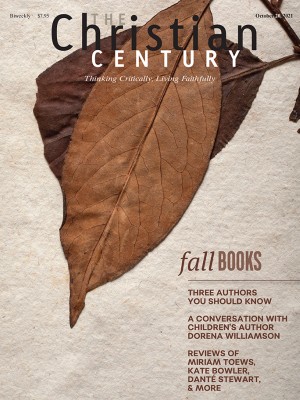Karl Barth’s affair with Charlotte von Kirschbaum wasn’t the only major conflict behind his theology
Christiane Tietz explores them all in the first full-length biography since Eberhard Busch’s in 1976.
For many years there was speculation about the relationship between Swiss theologian Karl Barth (1886–1968) and his assistant, Charlotte von Kirschbaum (1899–1975). It is known that she traveled with Barth, and they spent time together at a retreat house on Lake Zurich. Most scandalous of all, Kirschbaum lived in the Barth household. The only entry to her bedroom was through his adjacent study.
In 1991, Barth’s children put a stop to the speculation by releasing private correspondence which revealed that Barth and Kirschbaum had a romantic relationship, one that put extreme pressure on Barth’s relationship with his wife, Nelly, and put him at odds with his extended family. Barth’s mother was very disapproving of his mistress, as were some of his siblings, although Barth’s brother also had a mistress. “What good is the most discerning theology when it suffers a shipwreck in your own home?” his mother once wrote to him.
Read our latest issue or browse back issues.
Divorce between Barth and Nelly was broached several times, but it was never pursued. Barth felt an obligation to Nelly, but he couldn’t give up the emotional and intellectual bond with Kirschbaum. Instead, the Barth household lived with the constant tension of Kirschbaum and Barth’s relationship, despite the fact that his kids had some affection for her and called her Aunt Lollo. Barth referred to the triangular relationship as “the least imperfect solution.”
Christiane Tietz, who teaches systematic theology at the University of Zurich, gave an account of this troubling relationship in a talk at the American Academy of Religion in 2008, which was published in Theology Today in July 2017. And now we have access to the long affair woven into Tietz’s biography of Barth, the first full-length biography since the classic 1976 volume written by Eberhard Busch, Barth’s last student assistant.
Kirschbaum was not a trained theologian, but she became a theologian in her own right through her work for Barth. She published modestly and worked on the role of women in the Bible and in the church. She read and interacted with Simone de Beauvoir’s thought and could be considered part of the first wave of feminism.
It has long been rumored that Kirschbaum wrote some of the excursuses in Barth’s Church Dogmatics (the fine print parts that delve into exegetical and historical matters relevant to the subject at hand). Archival evidence disputes that, although Kirschbaum most likely did much of the research that went into these excursuses.
At one point in Church Dogmatics, Barth gives her explicit credit for her work. But from our vantage point it is clear that the entire Dogmatics as we know it—Barth’s 14-volume magnum opus—was only possible because of her dedicated assistance. Barth wouldn’t have been the Barth we know without Kirschbaum’s role in his life and work. In fact, he lost interest in finishing the Dogmatics once she started to slide into dementia later in her life and was institutionalized. There was an unarguable fecundity in the Barth-Kirschbaum relationship.
So what are we to make of this 40-year relationship today? Tietz warned her AAR audience against two tendencies, one toward voyeurism and the other toward moralism. Is this an example of a very flawed human being used by God nevertheless in all his humanness, his all-too-humanness? Another example of Luther’s assertion that God can use a crooked stick to draw a straight line?
The troubling nature of the Barth-Kirschbaum relationship is not limited to sexual infidelity. Did she get the credit she deserved for her contributions to Barth’s teaching and writing? Kirschbaum’s work for Barth raises serious questions about gender relationships and the role of women. He supported Kirschbaum and gave her an allowance—about the same amount an untrained laborer would have made at the time. This was clearly an unjust remuneration for all her work.
Barth claimed that his relational dilemma made him less judgmental of others. He thought people who didn’t really understand the situation shouldn’t stand in judgment of it. A more fruitful response than either voyeurism or moralism would be an exploration of Barth’s theology to see if his relationship with Kirschbaum made imprints on his views of marriage, fidelity, sexuality, and gender roles. Tietz looks for traces of the relationship in his theology, but clearly more work could be done in this pursuit.
Tietz’s very readable and accessible biography is aptly subtitled A Life in Conflict. The conflict over his relationship with his assistant was not the only conflict Barth suffered—or caused. Although he was an affable character who enjoyed conversation with friends, took childlike delight in listening to Mozart, and called himself “God’s cheerful partisan,” he could be irascible at times when his theology rubbed up against other theologians.
As a young pastor in Safenwil, Switzerland, Barth aroused the ire of industrialists and some of his parishioners by supporting workers and labor unions. He was called the “Red Pastor.” Years later he would be rebuked again by capitalists for his sympathy for and support of Christians in Eastern Europe and his criticism of anticommunism.
His liberal teachers, most notably Adolf von Harnack, were annoyed when Barth published his famous commentary on Romans in which he tried to reclaim God, rather than religious experience, as the subject of theology. Barth had lost faith in his teachers and their approach to theology when many of them supported Germany in the Great War.
Even though Barth shared many convictions with his fellow Swiss theologian Emil Brunner, they had a contentious battle over the propriety of natural theology. Brunner believed that human reason and reflection on nature and human experience could be sources of theology alongside biblical revelation. Barth said Nein! They later would clash over their different responses to communism. These confrontations resulted in a nearly lifelong alienation between the two theologians, although late in their lives there was a reconciliation of sorts.
This battle over natural theology must be set in the context of Barth’s struggle against the capitulation of the German church to Nazism, the most consequential conflict of his life. Barth was adamant that there could be no other source of theology besides revelation. Allowing any others, he believed, would open the door to viewing German culture and nationalism as sources of faith. He played a key role in the Confessing Church’s Barmen Declaration, which declared—against Hitler—that Jesus alone is Lord. Barth’s struggle against Nazism, including his refusal to take an oath of loyalty to Hitler, led to his being silenced in Germany, where he had been teaching. He accepted a teaching position in Basel in his native Switzerland, where he remained for the duration of his life.
Barth was unarguably the most consequential Protestant theologian in the 20th century, and he is still fervently read and quoted in some circles. To him, the contextual theology of his contemporary Paul Tillich was anathema because it looked first for the questions theology must address in the cultural context and only then sought answers in the sources of theology. (Incidentally, Tillich’s assistant was also his mistress, but he tried to keep that part of the relationship secret, even from his spouse.)
Barth seems to have lost the argument with contextual theology for the time being. Contextual theologies abound currently in mainline Protestantism and liberal Catholicism, and even many evangelical preachers today start with questions from our culture and then look to scripture for answers.
And yet we humans need constant reminders that the subject of our faith is God and not ourselves. For that reason, Barth is still relevant, in spite of his many flaws and his seemingly dated theology. Tietz’s biography is a good entry into his life and thought.






